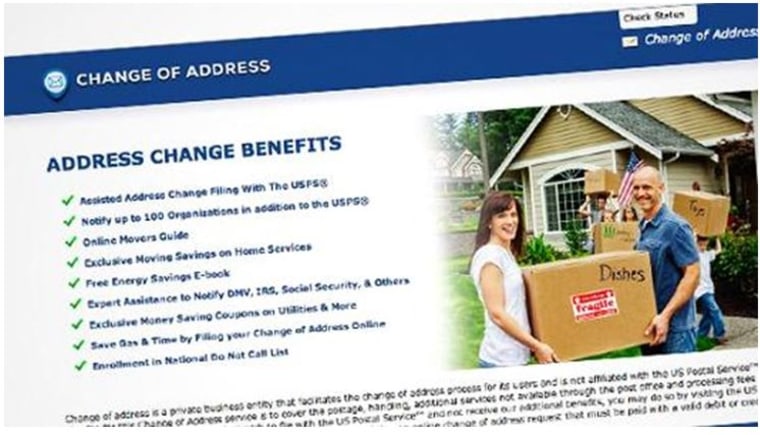People who paid much more than they expected to change their mailing addresses have some money coming back.
An Ohio company that runs two change-of-address websites will refund money to customers who may have been misled into using their service—thinking they had landed on the official U.S. Postal Service website.
Change-My-Address.com and Change-of-Address.us are run by Form Giant of Cincinnati. The sites charge $19.95 for the service, which the USPS provides for just a dollar. According to lawsuits filed by the states of Ohio and Washington, that price was never clearly disclosed.
"This company deceived consumers into thinking they were paying one dollar for the change-of-address service, when in reality, they were charged much more," said Ohio Attorney General Mike DeWine in a statement.
Last year, CNBC reported that complaints were pouring in about Change-My-Address.com.
At the time, the company told CNBC it provided generous "value-added services" for that $19.95 fee, such as special offers from major retailers.
But that price was not disclosed on the home page. Instead, it stated that the customer would pay a "one dollar processing fee charged by the USPS for submitting an online address change request."
The true price was hidden at the top of the payment page. Customers didn't see it because when that page loaded, the pricing information was cut off.
When CNBC shared the findings with law enforcement, it resulted in a joint investigation by the attorneys general in Washington and Ohio. Investigators were able to read the source code to see why the payment page didn't load properly.
"It was done deliberately, so the page would load midway and the consumer would not see the price," said senior counsel Paula Selis, who runs the high-tech unit in the Washington state attorney general's office. "You had to purposely scroll up to the top to see that you were going to pay $19.95. And how many people would do that?"
Deceptive practices claimed
Both states sued Form Giant and its president, Matthew Riley, claiming the company's business practices were deceptive.
"Consumers deserve clear, straightforward information before agreeing to buy any service or product," said Washington Attorney General Bob Ferguson in a statement.
On Monday, Form Giant and Riley agreed to settle those charges. They did not admit doing anything wrong, but the company has agreed that from now on it will disclose the actual cost of its service and make it clear that the company is not affiliated with the U.S. Postal Service.
The company will also provide up to $3 million in refunds to customers across the U.S. who might have mistakenly purchased the service. Negotiators estimate that there could be hundreds of thousands of people nationwide who qualify for refunds. Because the company did file the change-of-address requests with the USPS (which costs a dollar), the refund amount was set at $18.95.
The company has until May 24 to send an email to customers who have not already received a full refund that explains how to file a claim.
CNBC could not reach anyone from the company to comment on the settlement.
There is an important lesson here. Consumers need to be careful when doing an Internet search—the top listings may not be the site you really want. For example, search for "change of address" and the first results are for private businesses that charge a steep price to file an address change with the U.S. Postal Service. The official USPS site is further down on the list.
By the way, it's legal to do this—charge you to fill out a simple government form—as long as that private site clearly displays the price and discloses that it is not the official government site.
—By CNBC contributor Herb Weisbaum. Follow him on Facebook and Twitter @TheConsumerman or visit The ConsumerMan website.
